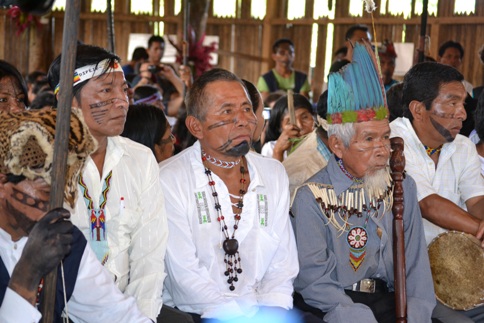






In 1992, Ecuador granted 135,000 hectares of land to the Kichwa indigenous people of Sarayaku. Four years later, these lands were included in the 200,000 hectares that the State granted to Argentine oil company CGC for the exploration and exploitation of oil.
After filing multiple complaints to the national authorities, the community of Sarayaku – some 1,200 members in size – was successful in delaying the extractive activities for several years. However, in 2002, members of the oil company forcibly entered the Sarayaku territory, guarded by both the military and private security forces. The company opened roads, introduced explosives and deforested land, destroying trees and plants of sacred and cultural value to the community. As a result of these actions – which took place between 2002 and 2003 – 1,400 kilos of pentolite explosive are currently below the Sarayaku territory, putting the lives of the Sarayaku people at serious risk and threatening their access to a dignified life.
Finally, after new complaints were made to the local authorities and the Office of the Ombudsman of Pastaza province, where the Sarayaku community lives, the extractive activities were suspended.
The case was brought before the Inter-American Human Rights System and in 2012 the Inter-American Court ruled against Ecuador for violating the Sarayaku community’s right to physical integrity and for seriously endangering their right to life. The court also established the State’s responsibility for the violation of the rights to consultation, community ownership and cultural identity, to the detriment of the people of Sarayaku.
Thanks to this ruling, 1,200 people were able to keep their ancestral lands, which are their primary means of survival and the continuation of their culture. In addition, the State has complied with the monetary compensation to the Community established in the ruling. More broadly, the case has shown how indigenous communities in the Americas can effectively defend their rights because it has established a legal precedent and has elevated indigenous people’s right to prior consultation to international standards. Since all of the States that have ratified the American Convention have to abide by the judgments of the Court, the order to request prior consultation and consent sets a new and important Inter-American standard intended to protect indigenous peoples’ rights to their ancestral lands.
Finally, the case highlights the positive feedback that regional monitoring and mechanisms produce by leveling the power dynamic between vulnerable population groups and the State. Thus, the case has led to the empowerment of the community, from victims to national actors with bargaining power vis-à-vis the State.
However, certain remedial measures established by the ruling have not been fulfilled. Only 16 of the 1,400 kilos of explosives in the territory have been removed, making much of the territory unusable. In addition, Ecuador has not harmonized its legislation on prior consultation and consent, an issue that (potentially) threatens the rights of other indigenous communities and even the Sarayaku.
Impact of the case
Help us continue this critical and urgent work with a donation!
DONATE NOW